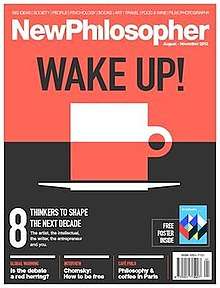New Philosopher
 The cover of first issue of New Philosopher. | |
| Editor | Zan Boag |
|---|---|
| Categories | Philosophy, Society, Culture, Art, Literature |
| Frequency | Quarterly |
| Publisher | Poet Press |
| Year founded | 2013 |
| Country | Australia |
| Based in | Hobart, Tasmania |
| Language | English |
| Website |
newphilosopher |
| ISSN | 2201-7151 |
New Philosopher is an ad-free newsstand philosophy magazine distributed throughout the United States, Canada, the UK, Australia, Europe, Asia, and New Zealand, and produced by the team behind the magazine Womankind.[1]
History and profile
New Philosopher launched in Australia in 2013 at the Byron Bay Writers Festival, where it was the bestselling item at the festival and number 6 at the festival the following year.[2] According to the University of Sydney, it launched with distribution "across 2,000 news agencies in Australia and New Zealand and circulation in book shops, airports, cafes, delis, art galleries, boutiques and museums."[3] According to posts on Facebook, as of 2015 New Philosopher was the most widely distributed philosophy magazine in the world, with more than 10,000 stockists globally.[4] Each edition is set around a philosophical theme and features an interview with a leading intellectual - previous subjects have included Noam Chomsky,[5] Daniel Dennett,[6] Thomas Piketty,[7] Jane Goodall, John Searle, Peter Singer,[8] Anita L. Allen,[9] Leo Braudy, Luciano Floridi, David Wood,[10] and David Chalmers.[11]
Contributors
The magazine includes writing from prominent intellectuals such as philosophers Peter Singer, Clive Hamilton, Angie Hobbs, Robert W. McChesney, Massimo Pigliucci, Nigel Warburton, and Howard Gardner; Booker Prize winners DBC Pierre and Peter Carey[12]; award-winning British novelist and essayist Will Self[13] and Pullitzer Prize finalist Nicholas G. Carr[14]; Australian cartoonist and Australian Living Treasure Michael Leunig; and five winners of the Australasian Association of Philosophy Media Prize: philosophers Damon Young, Patrick Stokes, Matthew Beard, Russell Blackford, and Paul Biegler.[15] The magazine's literary editor Antonia Case, who is also the editor of Womankind, won the Australasian Association of Philosophy Media Professionals' Award in 2014[16]; New Philosopher's editor-on-chief Zan Boag won the same award in 2017[17].
Awards and recognition
Described by the editor Zan Boag in an interview with MagCulture as being a magazine "as much about art and design as it is about philosophy",[18] the magazine has received attention for its design and editorial content. It was shortlisted for Best Use of Illustration in The Stack Awards 2016[19] and in 2017[20]; shortlisted for Editor of the Year[21] and Best Original Non-Fiction[22] in The Stack Awards in 2017; it was shortlisted in the World Illustration Awards 2016[23]; and the cover of the "happiness" edition was voted one of the coolest covers of February 2014 by Complex[24]. Design website Abuzeedo commented that "the design is super cool and out of the box" [25] and the American Institute of Graphic Arts (AIGA) featured the magazine, referring to it as a "very popular... ad-free publication that has become a favorite amongst readers in its home country...", a publication that takes "an approachable yet still thoughtful and intelligent tone".[26] The director of magazine website Magpile says "the design is calm, intelligent and very neat" and "if I needed to use just one word to sum up new Aussie magazine, New Philosopher, it would be 'smart'.”[27] It was named one of top magazines launched for 2014 (in the US) by the Library Journal[28] and New York Post listed it as one of six "magazines that will get you thinking", writing that it "feels like a coffee table book with beautiful pictures and large, double-spaced font".[29]
References
- ↑ "New Philosopher's Australian operation to launch women's magazine Womankind". mumbrella. Retrieved 29 July 2014.
- ↑ "Breaking records". Byron Bay Writers Festival.
- ↑ "Philosophy in demand: new magazine launches". University of Sydney. Retrieved 13 August 2013.
- ↑ http://www.facebook.com/newphilosopher/
- ↑ "Talking philosophy". The Philosophers’ Magazine. Retrieved 4 August 2013.
- ↑ "The secret of consciousness". New Philosopher. Retrieved 12 March 2014.
- ↑ "A property crisis". New Philosopher. Retrieved 24 August 2015.
- ↑ "Travelling with purpose". The Bull. Retrieved 10 August 2015.
- ↑ "Who's watching you?". New Philosopher. Retrieved 23 January 2016.
- ↑ "David C Wood CV". Vanderbilt Philosophy. Retrieved 4 August 2013.
- ↑ "Interview: David Chalmers and Andy Clark". NKU Philosophy. Retrieved 1 March 2014.
- ↑ "Philosophy in demand: new magazine launches". University of Sydney. Retrieved 13 August 2013.
- ↑ "The future of journalism". The City Reader. Retrieved 3 May 2015.
- ↑ "The virtual postman never stops ringing". Nicholas Carr. Retrieved 23 December 2017.
- ↑ "AAP Media Prize". AAP. Retrieved 2 September 2015.
- ↑ "AAP Media Professionals' Award". AAP. Retrieved 2 September 2015.
- ↑ "AAP Media Prize". AAP. Retrieved 23 December 2017.
- ↑ "Australia's New Philosopher". MagCulture. Retrieved 9 June 2015.
- ↑ "The Stack Awards 2016". Stack. Retrieved 23 April 2017.
- ↑ "The Stack Awards 2017 - Best Use of Illustration". Stack. Retrieved 23 December 2017.
- ↑ "The Stack Awards 2017 - Editor of the Year". Stack. Retrieved 23 December 2017.
- ↑ "The Stack Awards 2017 - Best Original Non-Fiction". Stack. Retrieved 23 December 2017.
- ↑ "The World Illustration Awards 2016". WIA. Retrieved 23 April 2017.
- ↑ "The Coolest Magazine Covers of February 2014". Complex. Retrieved 2 September 2015.
- ↑ "Editorial Design Inspiration". Abuzeedo. Retrieved 20 November 2014.
- ↑ "Australia's Popular New Philosopher Magazine Blurs the Line Between Indie and Mainstream". AIGA. Retrieved 15 June 2015.
- ↑ "New Philosopher". Magpile. Retrieved 24 November 2013.
- ↑ "A thriving print scene". Library Journal. Retrieved 21 April 2015.
- ↑ "Magazines that will get you thinking". New York Post. Retrieved 2 August 2015.